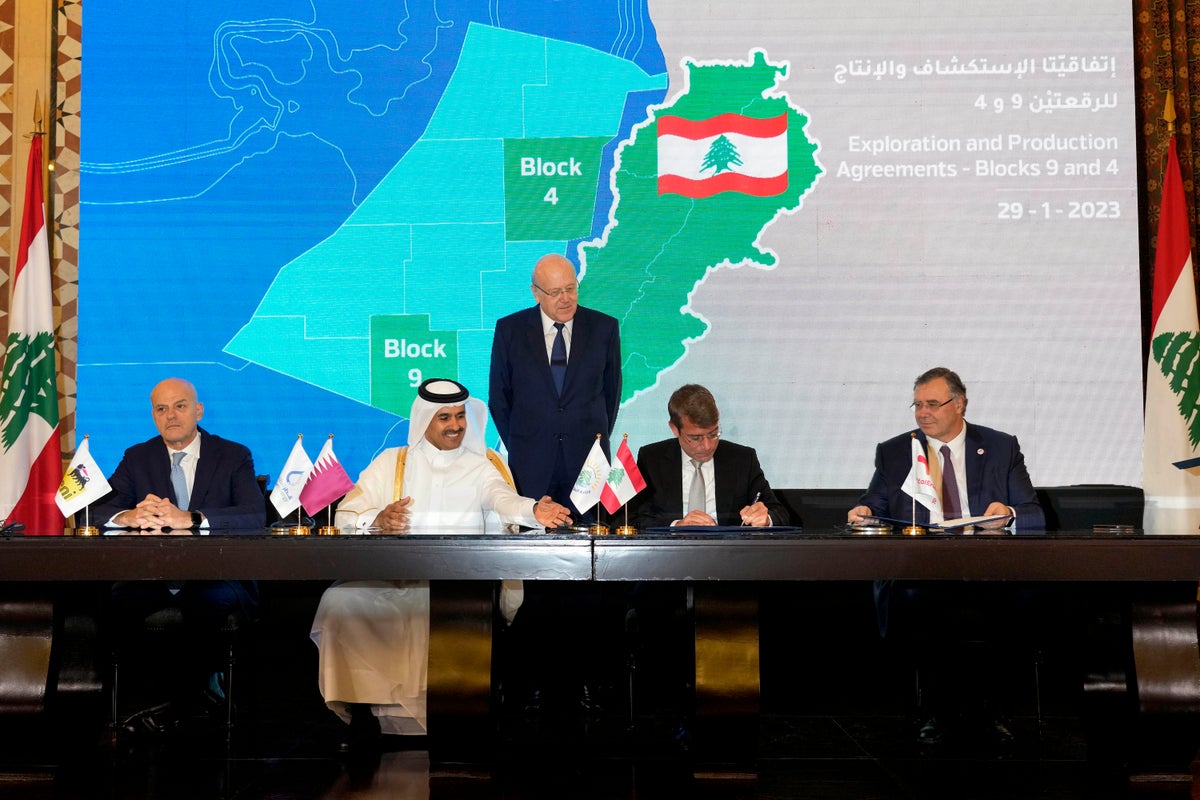
Lebanon, two international oil giants and state-owned oil and gas company Qatar Energy signed an agreement Sunday that the Qatari firm will join a consortium that will search for gas in the Mediterranean Sea off Lebanon’s coast.
The deal inked in Beirut brings Qatar into Lebanon's gas exploration market three months after Lebanon and Israel signed a U.S.-mediated maritime border agreement ending a yearslong dispute. Qatar Energy is replacing a Russian company that withdrew from the Lebanese market in September.
In 2017, Lebanon approved licenses for an international consortium including France's TotalEnergies, Italy's ENI and Russia’s Novatek to move forward with offshore oil and gas development for two of 10 blocks in the Mediterranean. The borders of one of the two blocks were disputed by neighboring Israel until a maritime border deal was reached last year.
The companies did not find viable amounts of oil or gas in block No. 4 north of Beirut, and drilling in block No. 9 in the south has been repeatedly postponed because of the dispute with Israel.
Lebanon and Israel have been formally at war since Israel’s creation in 1948.
The agreement was signed by Saad Sherida al-Kaabi, Qatar’s Energy Minister; his Lebanese counterpart Walid Fayad; Claudio Descalzi, the CEO of Italy’s state-run energy company, ENI, and TotalEnergies CEO Patrick Pouyanné. The signing ceremony was attended by Lebanon's caretaker Prime Minister Najib Mikati.
“Our concentration will be on block number nine,” al-Kaabi said, adding that this could be a first step for Qatar Energy to play a bigger role in future explorations.
Back in 2017, Total and ENI each got 40% stakes in the blocs while Novatek got 20%. Under the deal signed Sunday, Qatar Energy will take the 20% stake of Novatek in addition to 5% each from ENI and Total leaving the Arab company with a stake of 30%. Total and ENI will have 35% stakes each.
Lebanese media reported that exploration in block No. 9 could begin before the end of November. “We are committed to execute this first well as soon as possible,” TotalEnergies' Pouyanné said. The company said two months ago it would soon launch exploration activities in search of gas off Lebanon’s coast.
Cash-strapped Lebanon hopes that future gas discoveries will help the small Mideast nation pull itself out of the worst economic and financial crisis in the country’s modern history.
Since the crisis erupted in October 2019, the Lebanese pound has lost more than 90% of its value. Tens of thousands have become jobless and three quarters of the population of 6 million, including 1 million Syrian refugees, now lives in poverty.
“It is an honor to be in Lebanon with these two companies,” said Descalzi. “We will work all together to give the best to your country.”
Qatar is among the world’s top liquefied natural gas exporters and its state-owned company operates all of the country’s oil and gas exploration and production, making the nation among the world’s richest per capita. The tiny country, which borders Saudi Arabia to the east, shares control with Iran of the world’s largest underwater natural gas field in the Persian Gulf.







